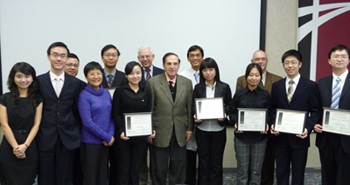 |
Pictured front row from left are Yi Zhao, Ma Kangmu, Huiling Pang, M.D., Ph.D., Mo Yanan, Harold M. Maurer, M.D., Zhang “Serena” Zhihua, Wu Qirong, Zhang “Tony” Chao, Jin “Jimmy” Yimmin; back row from left, Kai Fu, M.D., Ph.D., Han Bo, Don Leuenberger, Weining Ken Zhen, M.D., and Tom Rosenquist, Ph.D. |
The incoming students were selected to come to UNMC by the CSC — a powerful Beijing-based group (see sidebar) that selects top graduate students from elite Chinese universities to participate in exchange and research programs at select U.S. institutions.
The outgoing SJTUSM students had spent last fall doing rotations at UNMC.
|
The lunch featured comments from the SJTUSM and CSC students and a presentation from UNMC nursing student Lisa Lane, who went to China as part of an exchange program between UNMC and SJTUSM.
This is the fourth year UNMC has hosted students from SJTUSM and another group of medical students from the Shanghai school will come to Omaha this fall to do rotations.
This is the first year the CSC has sent large numbers of students to UNMC. They are here as part of an agreement that runs through 2011 and allows Chinese students to study at UNMC. More CSC students are expected to come to UNMC late this year.
Six of the CSC students are at the medical center to earn Ph.D. degrees, three are here to receive one or two years of training in medical center laboratories and one is taking part in a joint M.D./Ph.D. program that is supported by UNMC and the CSC.
In recent years, UNMC has developed a strong relationship with the CSC under the leadership of Dr. Maurer and others such as Don Leuenberger, vice chancellor for business and finance; Tom Rosenquist, Ph.D., vice chancellor for research; and Rubens Pamies, M.D., vice chancellor of academic affairs.
While in China this past October, a UNMC delegation led by Leuenberger signed a formal agreement with the CSC to accept Ph.D. students from the top 49 Chinese universities. In addition, the new agreement allows UNMC to bring qualified Ph.D. students and postdoctoral fellows into UNMC Ph.D. programs at all colleges. These students will be partially supported by the CSC.
“This is a golden opportunity for UNMC to accept outstanding Chinese Ph.D. students and postdoctoral fellows with partial financial support from the CSC,” said Jialin Zheng, M.D., associate dean of graduate studies-international affairs, director of the Asia Pacific Rim Development Program (APRDP) and a professor in the UNMC departments of pharmacology/experimental neuroscience and pathology/microbiology. “These students are bright, talented and highly motivated. They also will help establish friendships and collaborations between their home institutions and UNMC.”
Dr. Zheng said the hard work from many on campus — including personnel from each UNMC Ph.D. graduate program committee, the UNMC graduate office and the APRDP office — was key in getting applications reviewed and approved in short order to allow the CSC students to come to Omaha.
“Our chancellor is urging us to build a world class institution and having world-class collaborators and top students will help us with this important mission,” Dr. Zheng said.
Incoming CSC students are:
- Ma Kangmu, a student in the joint M.D./Ph.D. program;
- Huang Xin, a Ph.D. student in the UNMC toxicology program;
- Fu Lan, a Ph.D. student in the lab of John Davis, Ph.D.;
- Zhao Yi, a Ph.D. student in the lab of Alexander Kabanov, Ph.D.;
- Ren Ke, a Ph.D. student in the lab of Dong Wang, Ph.D.;
- Huang Xiuyam, a training student in the lab of Howard Gendelman, M.D.;
- Ji Ming, a training student in the lab of Kai Fu, M.D., Ph.D.;
- Bai Jirong, a Ph.D. student in Dr. Fu’s lab;
- Jiang Wei, a Ph.D. student in the lab of Oksana Lockridge, PhD; and
- Ye Ling, a training student in Dr. Zheng’s lab.
The SJTUSM students and their UNMC faculty advisers were:
- Mo Yanan — Huiling Pang, M.D., Ph.D.;
- Zhang “Serena” Zhihua — Weining Zhen, M.D.;
- Wu Qirong — John Chan, M.D.;
- Han Bo — Jue Wang, M.D.;
- Zhang Chao — Dr. Fu; and
- Yin Jimin — Chi Lin, M.D.